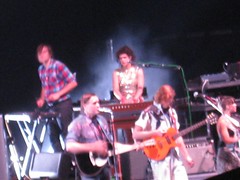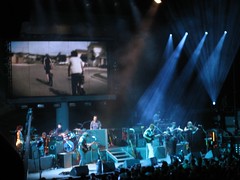It seemed a bit odd to be in the heart of New York City, listening to an indie band raised in the suburbs singing about the suburbs while thousands gathered (likely from the suburbs) and many more thousands watched online (many presumably also from the suburbs). But I had to keep reminding myself that I live in a world where mothers and daughters line up at midnight to watch movies with beautiful people about love … and vampires.
Indeed, it was a night of unexpected moments – an “indie” band selling out the fabled Madison Square Garden, being watched on YouTube sponsored by American Express be directed by Terry Gilliam who Win knows from the film Brazil (but most recognize him from more popular movies like 12 Monkeys and The Imaginarium Of Dr Parnassus). In between the opening acts of Owen Pallett (who was fantastic) and Spoon (who are amazing but the Garden was a bit too big for their acoustic sound), a radio dj declared to the 19,000 in attendance that this was a historic night in music. How could the Arcade Fire sell out two straight nights in the fabled Garden? And why would people come to see it when they could sit at home and watch for free?
 Selling out MSG in a down economy is pretty amazing. This is in light of Rolling Stone magazine reporting that summer ticket sales are down for the top 100 concert tours by 12 percent for the first half of this year which is the first time that’s happened in 15 years. So a band signed with Merge Records should have plenty to feel good about. However, as you listen to the Arcade Fire’s latest offering, The Suburbs, you will learn that this isn’t really true.
Selling out MSG in a down economy is pretty amazing. This is in light of Rolling Stone magazine reporting that summer ticket sales are down for the top 100 concert tours by 12 percent for the first half of this year which is the first time that’s happened in 15 years. So a band signed with Merge Records should have plenty to feel good about. However, as you listen to the Arcade Fire’s latest offering, The Suburbs, you will learn that this isn’t really true.
As the story goes, inspiration hit Win Butler when he saw a picture of an old friend holding his little daughter in front of Houston strip mall near their old neighborhood. The album is charged with varied raw emotions from angst to boredom to a lamenting off the loss of innocence and returns for another Funeral-esque look into childhood. But just like Neon Bible explored new sounds, most notably the organ, Suburbs mixes a little Springsteen Americana with an epic splash of U2 to fill the stadium in “Suburban War” and catchy bits of new wave in tracks like “We Used to Wait”. What’s different from Neon is that Butler seems to be less angry with the government, the church, and all authority, but more with his own soul as he wrestles not only with suburban life but with getting older. An acute sense of his self-awareness weaves through the album like in the title track, “The Suburbs”, “Modern Man” and “Sprawl 1 (Flatland)”.
There may even be a subtle swipe at the fans who have broken up with Arcade Fire “for not being indie enough” in the lines of Rococo:
“Let’s go downtown and talk to the modern kids, They will eat right out of your hand, Using great big words that they don’t understand. They say Rococo … They build it up just to burn it back down, The wind is blowing all the ashes around, Oh my dear god what is that horrible song they’re singing Rococo! They seem wild but they are so tame …”

One could not help but think of this while surrounded by the Brooklyn hipsters and the Urban Outfitters. While I am not really sure what qualifies as an “indie band” or an “indie fan” anymore because I know I smelled a lot of Abercrombie cologne and I saw a Jersey Shore wanna-be cast member (I think he called himself the “Imitation” and he may have been Greek but as a citizen of the Banana Republic, I ought to not judge).
It is true, there are many ironies but what about all the other bands that write their songs from their McMansions with the Mercedes E-Class in the driveway yet pretend they can still relate to the general culture? My greatest fears is that one day, it will be revealed that Green Day’s American Idiot was partially inspired by Billy Joe Armstrong’s poor landscaper and a tragic venti White Chocolate Mocha experience at Starbucks.
The truth is we need more albums that confront suburban living from people who will admit they were raised in the suburbs and have remained. Albert Hsu’s The Suburban Christian reports that this the first time in American history that more people live in the suburbs than in the cities and rural towns combined. To those who regard themselves as Christians, the reality is not all of us are called to live the urban monastic lifestyle like Shane Claiborne, some of us are called to be here. But just like my dad handed me Mere Christianity and I will one day hand my sons Irresistible Revolution, we need to begin to follow Jesus right where we are.
 Among the reasons of why I think many Christians have embraced the music of the Arcade Fire is that they choose to confront their problems, angst, and anxiety in ways that are not only not trite but divorced from the Christian subculture though they use a fair amount of religious imagery and language. This nine-piece miniature choir who exchange instruments and preach to their masses from a stage that is designed to appear as though they are playing from under an overpass highway system creates so much cathartic energy that even with the “kids (that) are all standin’ with their arms folded tight” in “Month of May” let loose and dance a little. In addition, there was an awkwardly placed billboard stand emerging from behind the drums that played videos of suburban experiences like kids riding bicycles in culde-sacs, giving “noogies” in the front yard, and glimpses of young love. Whether you were raised downtown, in a small town, or “in the valley” It seemed to me that almost everyone could connect.
Among the reasons of why I think many Christians have embraced the music of the Arcade Fire is that they choose to confront their problems, angst, and anxiety in ways that are not only not trite but divorced from the Christian subculture though they use a fair amount of religious imagery and language. This nine-piece miniature choir who exchange instruments and preach to their masses from a stage that is designed to appear as though they are playing from under an overpass highway system creates so much cathartic energy that even with the “kids (that) are all standin’ with their arms folded tight” in “Month of May” let loose and dance a little. In addition, there was an awkwardly placed billboard stand emerging from behind the drums that played videos of suburban experiences like kids riding bicycles in culde-sacs, giving “noogies” in the front yard, and glimpses of young love. Whether you were raised downtown, in a small town, or “in the valley” It seemed to me that almost everyone could connect.
If they could not, there was Win’s wife Regine Chassagne singing a song called “Haiti” which was released back in 2004. She wrote it more as a eulogy but carries an obvious prophetic fulfillment today: Haïti, never free, n’aie pas peur de sonner l’alarme (never fear to sound the alarm), Tes enfants sont partis (Your children fled), In those days their blood was still warm. We were further haunted when she sang Sprawl II (Mountains Beyond Mountains), “They heard me singing and they told me to stop. Quit these pretentious things and just punch the clock. Sometimes I wonder if the world’s so small. Can we ever get away from the sprawl? Living in the sprawl dead shopping malls rise like mountains beyond mountains. And there’s no end in sight, I need the darkness, someone please cut the lights.
Some of us will never move out the suburbs but may we find it in God’s will to create a better suburban culture. One that confronts the pain and restlessness and pursues redemption, forgiveness and hope. If you need an anthem, I can think of no better closing line than in their popular encore “Wake Up”, “With my lightnin’ bolts a glowin’, I can see where I am, go-go, where I am, You’d better look out below!”





Speak Your Mind